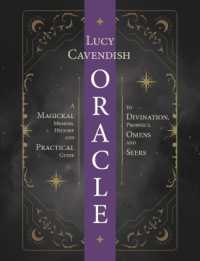基本説明
Covers the expected staples of the sub-discipline from agricultural geography and counter-urbanization to hidridity and community.
Full Description
Key Concepts in Rural Geography is a new kind of textbook that forms part of an innovative set of companion texts for the Human Geography sub-disciplines. Organized around 20 short essays, Key Concepts in Rural Geography provides a cutting edge introduction to the central concepts that define contemporary research in rural geography. Involving detailed and expansive discussions, the book includes: - an introductory chapter providing a succinct overview of the recent developments in the field - over 20 key concept entries with comprehensive explanations, definitions and evolutions of the subject - extensive pedagogic features that enhance understanding including a glossary, figures, diagrams and further reading Key Concepts in Rural Geography is an ideal companion text for upper-level undergraduate and postgraduate students in rural geography and covers the expected staples of the sub-discipline from agricultural geography and counterurbanization to hybridity and community. Written by an internationally recognized set of authors, Key Concepts in Rural Geography is an essential addition to any geography student's library.
Contents
Introduction Introducing Rural Geography Definitions and Representations Rurality and post-rurality Rural idyll Landscape Nature and the environment People and Communities Community Migration, counterurbanization and population change Class Culture Gender and sexuality Health and wellbeing Marginalized rural lifestyles Poverty, deprivation and social exclusion Resources and Economies Agricultural geography Productivism and the post-productivist tradition Agri-food system Neoliberalism and economic restructuring Resource management and resource politics Commodification and amenity landscapes Land use planning Rural development Changes and Challenges Globalization Rural policy, politics and protest Governance and governmentality Technology Hybridity and post-humanism






